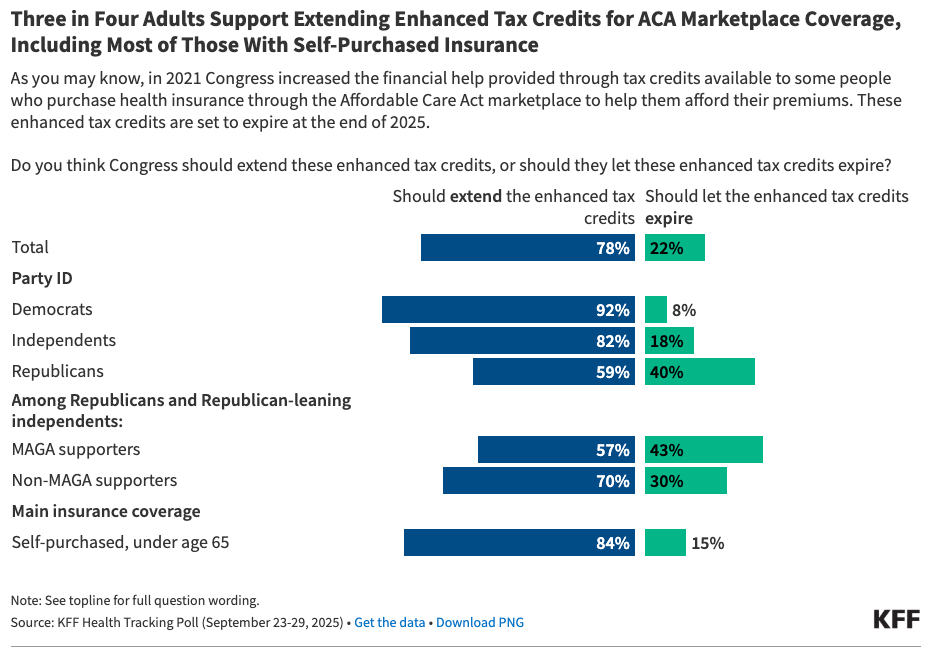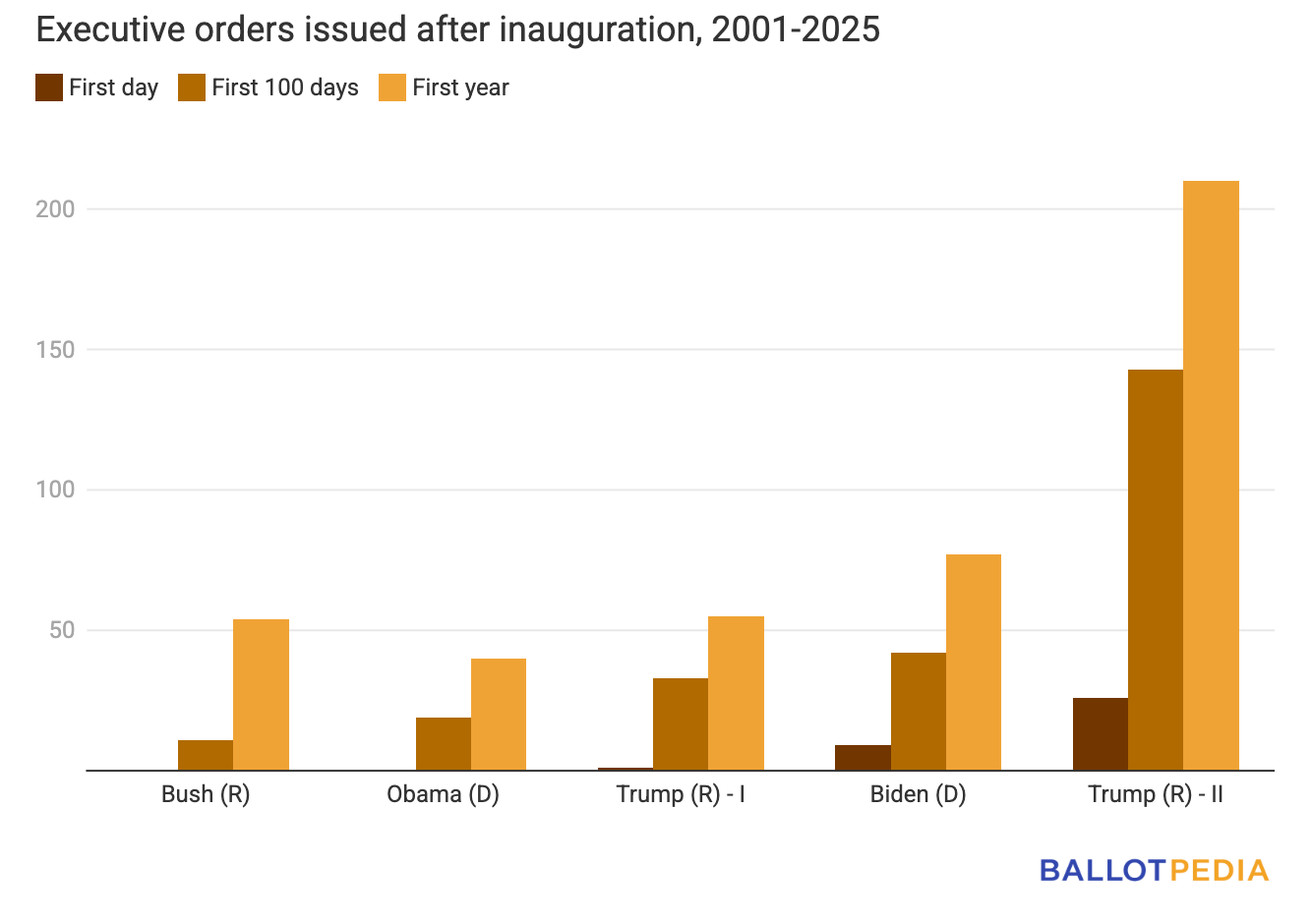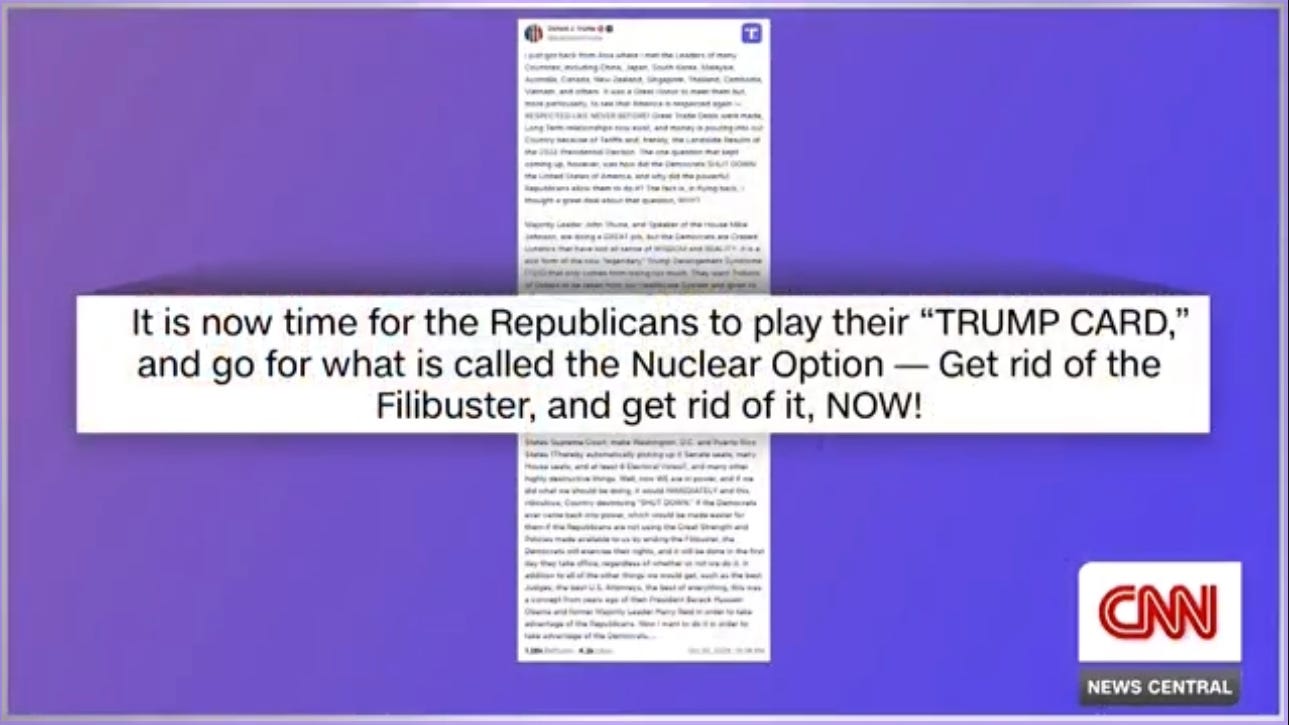Trump returned from Asia talking about removing the filibuster to pass the appropriations bill and reopen the government. The conflicting desire of Senate Republicans to keep the filibuster was the topic of the Sunday news programs yesterday morning.
Here we are, 32 days into the 2025 government shutdown. Ironically, the argument is over failing to break the filibuster on an appropriations bill for the spending resulting from a budget reconciliation bill that bypassed the filibuster process. Not a single Democrat in either the House or the Senate voted for the “One Big Beautiful Bill Act” (or “OBBBA”. ) so Trump is just asking the Senate to change the rules to approve its spending and finish this. Senate Republicans don’t want to cancel the filibuster. In this one case, I agree with Trump on the process.
The News
From CNN’s reporting of Trump’s post on Truth Social:
President Trump is now calling on Republicans to go nuclear. The president posting online. “It is now time for the Republicans to play their TRUMP card and go for what is called the nuclear option. Get rid of the filibuster and get rid of it.” Now the filibuster requires 60 votes to pass funding to reopen the government. Getting rid of it would mean Republicans could pass the bill with a simple majority vote, but it’s empty on Capitol Hill this morning and senators have left town for the weekend ahead of the critical day.
I, for one, want to just get rid of the legislative filibuster.
The first thing, as it’s important to note, is that the Constitution called for a legislative branch that actually gets things done. The Constitution was written in 1787 in response to the Articles of Confederation, ratified in 1781, that originally required the Continental Congress to pass laws with a supermajority, or 9 out of 13 states approving a law, and this Continental Congress was plagued with legislative gridlock. In response, the founding fathers set up Congress to pass laws with a simple majority, including even in the Senate, where it was clearly written that the Vice President of the United States could break any ties.
This isn’t just my opinion. This is basic history, as even taught on PBS:
Part of the reason our founders replaced the Articles of the Confederation with the Constitution is that with the Articles, it was hard to get things done. Passing laws required a supermajority. So in the Constitution, its authors only named five things that require a supermajority in the Senate. But everything else was expected to be done with a simple majority. Because in the Senate, they gave the Vice President the ability to break a ton.
And I’m not a mathematician, but if one person has the ability to break a tie, then the only possibility is that they’re doing it with a simple majority and not a supermajority.
No real protection against partisanship
Not everything in Congress requires a 60-40 vote anyway.
Because some things just couldn’t afford to be held up in a filibuster, in 1973, rules were changed so that critical measures, including Budget Reconciliations could be passed with a simple majority and without accommodating the rules of a filibuster.
As such, the OBBBA was packaged as a Reconciliation Bill and passed with a simple majority 51-50. Vice President JD Vance broke the tie. While I don’t agree with the content of the OBBBA, its passing was consistent with the process as outlined in the Constitution to move business along.
Starting in 2013, Senate rules were changed so that things like cabinet appointees could be done without filibuster. This was initiated during the Obama administration, but even today, Republicans benefit from this removal of the filibuster of cabinet appointments. There are multiple examples of current cabinet members that were confirmed with far less than 60-40 votes and without a single vote from Democrats.
Secretary of Defense Pete Hegseth was confirmed on a 51-50, with a tiebreaking vote from Vice President JD Vance. All Democrats voted not to confirm him, and they were joined by three Republicans including Mitch McConnell, Lisa Murkowski, and Susan Collins.
FBI Director Kash Patel was confirmed on a 51-49 vote, with all Democrats voting against him. Lisa Murkowski and Susan Collins joined the Democrats.
Department of Health of Human Services Secretary, RFK Junior was a similar case, where he was confirmed on a 52-48 vote with all Democrats voting against the confirmation, joined by one Republican, Mitch McConnell.
Again, in all of these cases, Republicans benefited from the lack of filibuster to push a partisan agenda.
Starting in 2017, Republican Senators changed the filibuster to allow for Supreme Court nominations to happen without filibuster.
The reason we have Neil Gorsuch, Brett Kavanaugh, and Amy Coney Barrett on the Supreme Court is as the result of a simple majority, not a 60-40 vote. Neil Gorsuch was confirmed 54-45, with only 3 Democrats voting to confirm him. Brett Kavanaugh was confirmed 50-48, with only 1 Democrat voting to confirm him. Amy Coney Barrett was the most partisan confirmation, being confirmed with a 52-48 vote, with no Democrats voting to confirm her. One Republican (Susan Collins of Maine) even sided with the 47 members who caucus with the Democrats.
Again, all these Supreme Court justices were confirmed without a filibuster. I am not against this procedurally, as the Constitution calls for majority rule.
Why do Republicans want to keep the filibuster?
Of course, John Thune, speaker of the House, and Mitch McConnell, former speaker of the House are both against getting rid of the filibuster for legislative actions. They claim it’s to prompt bipartisanship and compromise. Don’t believe it.
This is speaker John Thune, again repeating lies.
You don’t hijack the federal government to try and create a trillion and a half dollars in new spending. free healthcare for non-citizens and you can go right down the list. I mean this isn’t even realistic.
Note this isn’t new spending, as these ACA subsidies were already in place as the result of the American Rescue Plan Act in 2021 and were extended by the Inflation Reduction Act of 2022. The discussion was not new spending but whether to extend subsidies. I’ve mentioned before that extending these subsidies is what the American people want, making up 3 in 4 adults who support extending these subsidies, including 59% of Republicans and 57% of MAGA supporters.

Moreover, Thune is following an RNC playbook claiming Democrats are trying to push healthcare benefits for illegal aliens. (This is just false.)
And yet, Thune says “they’re not serious people.”
Even while supposedly negotiating, the leadership is not doing so in good faith, both lying about new spending and falsely claiming benefits for illegals, and calling the Democrats “not serious people” over an issue supported by the majority of Americans.
While I remained hopeful at one point that a filibuster could promote bipartisanship, these players have not hesitated one moment to promote a partisan agenda in other realms, including budget reconciliation, cabinet appointments, and for Supreme Court justices.
They have also not hesitated in allowing the Trump administration to write executive orders. Rather than letting Congress do the work of writing laws, the Republican members of the House and Senate have chosen not to go about the business of bipartisan negotiation and compromise, instead defaulting to Trump to write executive orders right out of the gate.

So why do Republicans LIKE the filibuster for legislative actions? Why are they even letting themselves get bungled up by this appropriations bill?
There are two reasons.
In the short term, they are trying to divert attention from the unpopular pillars of the OBBBA bill itself, and they are instead trying to shift blame to Democrats for shutting down the government.
In the longer term, they don’t want to be in the position of doing things that are popular with the majority of Americans, much like with these ACA subsidy extensions. Historian Heather Cox Richardson sets some historical context with the filibuster originally being used to block Civil Rights legislation, then by Southern Democrats.
“But pretty famously, we get the filibuster of the Civil Rights Act of 1964 by Southern Democrats, and then you’re going to get a major filibuster by Strom Thurmond, which is one maybe many people remember in the 1950s trying to, I’m sorry, the 1950s and the 1960s of the Civil Rights Act by people trying to guarantee that we’re not gonna get civil rights legislation.”
In more recent times, the use of the filibuster in the Senate has exploded. Here was a statistic cited by Joe Biden at the beginning of his presidency to outline just often the filibuster is used to block legislation:
I had a card on this, I was going to give you the statistics, but you probably know them, that it used to be that from between 1917 and 1971, the filibuster existed. There were a total of 58 motions to break a filibuster that whole time. Last year alone, there were five times that many. So it’s being abused in a gigantic way.
It’s basically used as a strategy or a game theory to block legislation and bring the government to a halt. Barack Obama explained the problem during his presidency.
Public service is not a game.
It is a privilege, and the consequences of action or inaction are very real. The American people deserve better than politicians who run for election telling them how terrible government is, and then devoting their time in elected office to trying to make the government not work as often as possible.
And in more recent times, the tool has specifically been used by Republicans to target legislation by Democrats. Heather Cox Richardson provides some analysis:
So what that means is the Republicans are perfectly happy with the filibuster the way it is. because they can then turn around and filibuster the legislation that Democrats want because we’re at this extreme point in American politics where the Republican party really would like to stop the federal government from doing anything. That’s the idea. They want to go back to a system from before the time of Eisenhower and Teddy Roosevelt, back to the time before the liberal consensus. And they’re pretty open about that.
This has an interesting impact on democracy, essentially giving the minority position undue power. She continues:
Because rather than there being the weight on the minority to have to take a big stand to stop something, to talk all night, for example, or to try and change people’s minds, the weight of trying to get legislation through falls on the people who want to pass it, who actually have a majority. So it’s much harder for the majority to actually get legislation than it is for the minority to stop legislation.
While in the short term, many progressives may want to use the filibuster to slow down the Trump administration, GOP operatives know that removing the filibuster will allow progressives, fresh off a Blue Wave responding to unpopular Trump administration policies, will come back on a mission to create new laws to reform the system itself.
The system can work better
I believe the system can work better without the filibuster. By making it easier to pass laws, we can make each one of them simpler and smaller.
With such a high bar to pass any individual legislation, we get these big omnibus trillion dollar bills that contain so many issues that even our congresspeople can’t keep track of them. This year, for example, we didn’t get the opportunity to review simple laws around healthcare, Medicaid, immigration, and other issues independently.
Heather Cox Richardson discussed how, in the absence of widespread filibuster use, legislation was more of a daily, incremental action
And so let me tell you why some people now argue that we need it. And that’s that they say that it forces the Senate to be bipartisan. That is, I cannot emphasize how wrong that is. And I’m a scholar of Congress. So believe me, I have read literally dozens, decades of congressional debates. And the answer is that if you have to pass things by a simple majority,
It’s understood that you’re gonna make changes largely incrementally and that if you get egg all over your face, you’re gonna pay for it. So people say, we’re gonna whip lash back and forth, but that’s not all that happened when you actually had things passing by a simple majority. Things did change and certainly people argued about things, but there was much more sense of legislation being a daily process and you would, if you really screwed up, you pay for it at the next election.
But there weren’t these giant sweeps back and forth that we now have where you have to have a super majority to get something so the legislation
So, with this appropriations bill, I am OK with the “nuclear option” to set a precedent to remove the filibuster for all legislative actions. Let’s let the Republican leadership take responsibility for their partisan OBBBA and continue their appropriation. Ideally, a few rank-and-file Republican senators could get a conscience, depart from their leadership in the absence of the filibuster, and side with the 47 Democrats to to extend the ACA subsidies in a smaller bill.
For the longer term future, I like what Obama said about the future:
We know that there are folks there, Republican and Democrat, who want to get things done.
And frankly, privately, they’ve expressed to me their recognition that the system in the Senate had broken down and what used to be a sporadic exercise of the filibuster had gotten completely out of hand.
He continued on how everything should work:
And if there are differences in the Senate, then debate should be had. People should vote their conscience. They should vote on behalf of their constituents. But they should vote.
That’s what they’re there to do. And ultimately, if you’ve got a majority of folks who believe in something, then it should be able to pass.
I call on us as Americans to demand this basic set of priorities in the legislature so we can start passing better laws, fix our system, and return ourselves to a functioning three branches of government.











